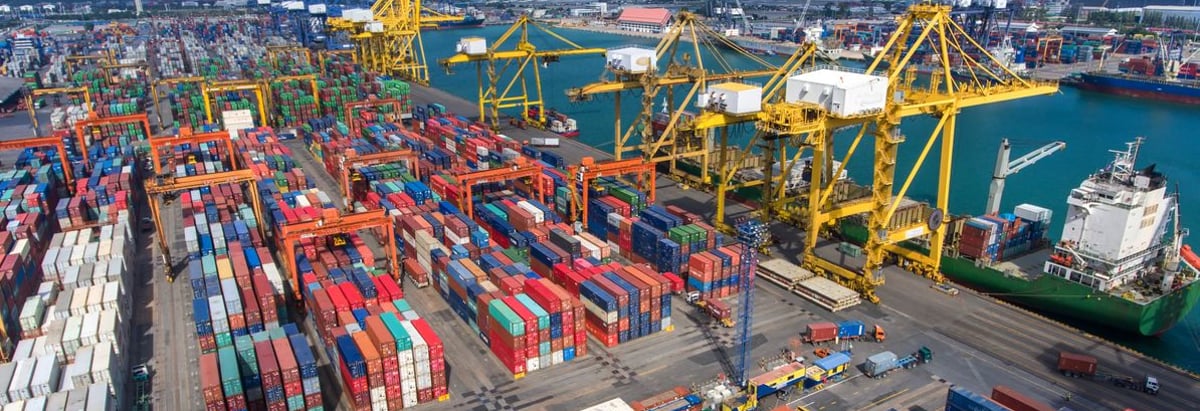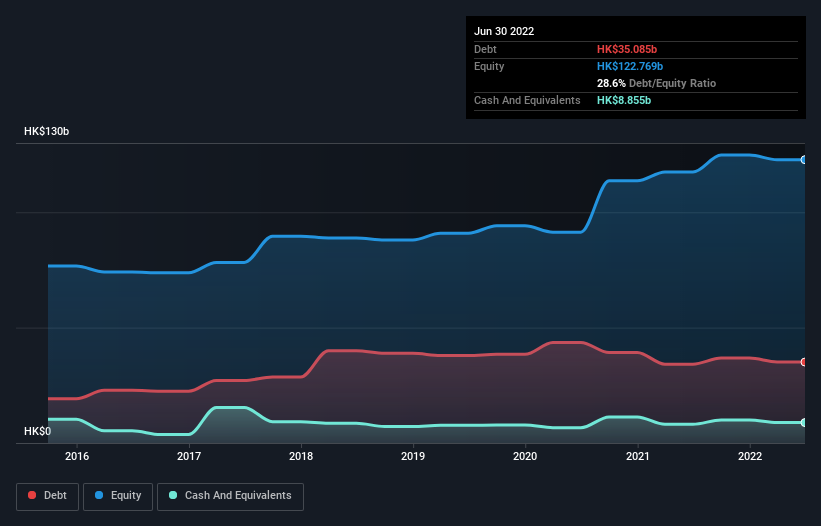- Hong Kong
- /
- Infrastructure
- /
- SEHK:144
Here's Why China Merchants Port Holdings (HKG:144) Can Manage Its Debt Responsibly

The external fund manager backed by Berkshire Hathaway's Charlie Munger, Li Lu, makes no bones about it when he says 'The biggest investment risk is not the volatility of prices, but whether you will suffer a permanent loss of capital.' So it might be obvious that you need to consider debt, when you think about how risky any given stock is, because too much debt can sink a company. As with many other companies China Merchants Port Holdings Company Limited (HKG:144) makes use of debt. But the more important question is: how much risk is that debt creating?
When Is Debt A Problem?
Debt is a tool to help businesses grow, but if a business is incapable of paying off its lenders, then it exists at their mercy. In the worst case scenario, a company can go bankrupt if it cannot pay its creditors. While that is not too common, we often do see indebted companies permanently diluting shareholders because lenders force them to raise capital at a distressed price. By replacing dilution, though, debt can be an extremely good tool for businesses that need capital to invest in growth at high rates of return. The first step when considering a company's debt levels is to consider its cash and debt together.
Check out our latest analysis for China Merchants Port Holdings
What Is China Merchants Port Holdings's Net Debt?
The chart below, which you can click on for greater detail, shows that China Merchants Port Holdings had HK$35.1b in debt in June 2022; about the same as the year before. However, it also had HK$8.86b in cash, and so its net debt is HK$26.2b.

How Healthy Is China Merchants Port Holdings' Balance Sheet?
We can see from the most recent balance sheet that China Merchants Port Holdings had liabilities of HK$17.7b falling due within a year, and liabilities of HK$36.0b due beyond that. Offsetting this, it had HK$8.86b in cash and HK$4.13b in receivables that were due within 12 months. So it has liabilities totalling HK$40.7b more than its cash and near-term receivables, combined.
This deficit is considerable relative to its market capitalization of HK$46.5b, so it does suggest shareholders should keep an eye on China Merchants Port Holdings' use of debt. This suggests shareholders would be heavily diluted if the company needed to shore up its balance sheet in a hurry.
We measure a company's debt load relative to its earnings power by looking at its net debt divided by its earnings before interest, tax, depreciation, and amortization (EBITDA) and by calculating how easily its earnings before interest and tax (EBIT) cover its interest expense (interest cover). This way, we consider both the absolute quantum of the debt, as well as the interest rates paid on it.
China Merchants Port Holdings's debt is 4.3 times its EBITDA, and its EBIT cover its interest expense 2.8 times over. Taken together this implies that, while we wouldn't want to see debt levels rise, we think it can handle its current leverage. On the other hand, China Merchants Port Holdings grew its EBIT by 28% in the last year. If sustained, this growth should make that debt evaporate like a scarce drinking water during an unnaturally hot summer. There's no doubt that we learn most about debt from the balance sheet. But it is future earnings, more than anything, that will determine China Merchants Port Holdings's ability to maintain a healthy balance sheet going forward. So if you want to see what the professionals think, you might find this free report on analyst profit forecasts to be interesting.
Finally, a company can only pay off debt with cold hard cash, not accounting profits. So we always check how much of that EBIT is translated into free cash flow. Over the last three years, China Merchants Port Holdings actually produced more free cash flow than EBIT. There's nothing better than incoming cash when it comes to staying in your lenders' good graces.
Our View
Both China Merchants Port Holdings's ability to to convert EBIT to free cash flow and its EBIT growth rate gave us comfort that it can handle its debt. Having said that, its interest cover somewhat sensitizes us to potential future risks to the balance sheet. We would also note that Infrastructure industry companies like China Merchants Port Holdings commonly do use debt without problems. Considering this range of data points, we think China Merchants Port Holdings is in a good position to manage its debt levels. But a word of caution: we think debt levels are high enough to justify ongoing monitoring. When analysing debt levels, the balance sheet is the obvious place to start. But ultimately, every company can contain risks that exist outside of the balance sheet. For example, we've discovered 2 warning signs for China Merchants Port Holdings that you should be aware of before investing here.
If, after all that, you're more interested in a fast growing company with a rock-solid balance sheet, then check out our list of net cash growth stocks without delay.
New: AI Stock Screener & Alerts
Our new AI Stock Screener scans the market every day to uncover opportunities.
• Dividend Powerhouses (3%+ Yield)
• Undervalued Small Caps with Insider Buying
• High growth Tech and AI Companies
Or build your own from over 50 metrics.
Have feedback on this article? Concerned about the content? Get in touch with us directly. Alternatively, email editorial-team (at) simplywallst.com.
This article by Simply Wall St is general in nature. We provide commentary based on historical data and analyst forecasts only using an unbiased methodology and our articles are not intended to be financial advice. It does not constitute a recommendation to buy or sell any stock, and does not take account of your objectives, or your financial situation. We aim to bring you long-term focused analysis driven by fundamental data. Note that our analysis may not factor in the latest price-sensitive company announcements or qualitative material. Simply Wall St has no position in any stocks mentioned.
About SEHK:144
China Merchants Port Holdings
An investment holding company, operates as a port operator in Mainland China, Brazil, Hong Kong, Taiwan, and internationally.
Solid track record with adequate balance sheet.


